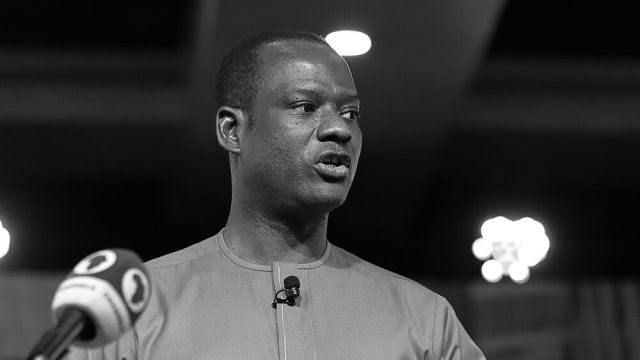Taiwo Oyedele, the Chairperson of Nigeria’s Presidential Fiscal Policy and Tax Reforms Committee, says he was forced to flee his home and now lives under police protection after receiving death threats for leading efforts to reduce tax-related extortion in Nigeria.
The threats followed his public comments about stopping more than 60 government agencies from collecting taxes and levies illegally.
Speaking in an interview on Nigeria Info on Wednesday, Mr Oyedele said he never imagined the scale of backlash that would follow his policy reform efforts.
He disclosed that he had to abandon the house he built over more than a decade and move to a secret location under the watch of armed police officers.
“My family got a death threat… I had to pack out of my house,” he said.
“I rented a place in a secret location where I live now. I’m not the kind of person that wants anybody carrying gun to follow me around, but I had to accept mobile police protection.”
Safety Concerns
Mr Oyedele said the impact of the threats went beyond him. His wife, he explained, now observes fasting every night due to fear for his safety, often losing sleep and struggling to function at work the next day. His mother who is close to 80 years, distressed by media reports, began fasting as well and eventually developed an ulcer.
“There’s this bit of sacrifice that people don’t see,” he said. “If you’re not in the public sector to steal money, it is not attractive at all.”
He added that the goal of his public service is to make a national impact, not personal gain. “The only consideration for someone like me is the opportunity to make an impact on a large scale,” he said.
The fiscal reforms spearheaded by Mr Oyedele’s committee were given legal backing on 26 June, when President Bola Tinubu signed four new laws,the Nigeria Tax Act, the Nigeria Tax Administration Act, the Nigeria Revenue Service Act, and the Joint Tax Board Act.
These laws consolidate earlier tax reform bills and are designed to simplify tax collection, eliminate illegal , and improve transparency across all levels of government. The reforms take effect from 1 January 2026.
Mr Oyedele said many of those who resisted the reforms were not low-level tax collectors but highly connected individuals who had turned government-backed levies into private revenue streams.
“The bulk of the money they were collecting was for themselves,” he said. “They have principals, and those principals are not small boys and girls. They’re big people that have resources. They are connected. So they will fight normally.”
Although police and the Department of State Services investigated the threats, authorities were unable to identify those behind them. Mr Oyedele said he believes the risk has reduced now that the laws have been passed.
“Now that the laws have been signed, there’s really no point for anybody to hurt me,” he said. “Even if anything happens to me now, I will die a happy person, because Nigerians will remember there was a guy who was trying to help his country.”
PAYE changes
One of the central changes in the new law is a restructuring of the personal income tax system. Under the new framework, Nigerians earning N110,000 or less per month will no longer pay any Pay-As-You-Earn (PAYE) tax.
Those earning between N110,000 and N2 million monthly will pay less than they currently do, while only those earning above N2 million a month will see slight increases in their tax rate.
The top PAYE rate will rise to 25 per cent, mainly affecting high-net-worth individuals.
Mr Oyedele defended the rate increase, saying it targets those with more capacity to give. “Even for these high-net-worth individuals that we are asking to pay a little bit more, they also are the ones that mostly own businesses or are the executives,” he said.
He also clarified that the rates will apply uniformly across all states, given that the laws were passed by the National Assembly and are binding nationwide.
The committee plans to embark on a six-month campaign to raise awareness, especially among small businesses and low-income earners, to ensure they benefit from the waivers and are not extorted by uninformed or unscrupulous officials.
No VAT hike
Despite earlier proposals, Mr Oyedele confirmed that the government has dropped plans to increase the VAT rate. Instead, the new laws remove VAT from key goods and services that account for over 80 per cent of Nigerians’ household spending.
These include food, education, healthcare, accommodation and transport. The zero-rating means these items will not attract VAT, and producers can now reclaim VAT paid on inputs, which is expected to lower production costs and possibly prices.
He explained the difference between VAT exemption and zero-rating, noting that zero-rated goods allow producers to recover input VAT and reduce the final cost.
“When you make bread to be zero-rated, bread does not carry VAT, and any VAT that you incur in producing bread, you recover it back from the government,” he said.
The reforms also allow businesses to reclaim VAT on capital goods, services and inventories, a move expected to reduce operating costs across sectors.
READ ALSO: Nigerian newspaper unveils summit to shape Nigeria’s creative economy
Mr Oyedele urged businesses to pass on the benefit to the public by lowering their prices. “We should not overburden businesses with cost,” he said. “Those costs have now been removed.”
Boosting productivity
Mr Oyedele said the ultimate goal of the reforms is to expand productivity and protect the vulnerable, not to generate quick revenue.
“We didn’t set out to do reform so that we can collect more revenue for government,” he said. “That would be placing the cart before the horse. The objective was to make the system work for everyone, particularly people below the middle class.”
He acknowledged that while macroeconomic indicators such as debt service-to-revenue ratio have improved from 97 per cent in 2022 to under 50 per cent the real impact on individuals will come once the new laws take effect.
“As people collect their salaries in January 2026, they will see that their net pay has increased, even though their salary hasn’t changed,” he said. “That’s the micro effect.”
He added that the reforms are designed to boost consumer spending, stimulate business expansion, and reduce inequality over time.
Praise for Tinubu
He credited President Tinubu for showing political will, even when the reforms became politically sensitive.
“Most of the things we did, we didn’t discuss with Mr President in advance,” he said. “They were blaming it on him, and he took all of it. He never, for once, blamed us.”
He said Mr Tinubu’s leadership ensured the reforms could move forward, despite resistance rooted in tribal, regional and religious sentiments.
“I don’t know whether any other president since our independence would have been able to put through what we have done,” he said.
Support PREMIUM TIMES’ journalism of integrity and credibility
At Premium Times, we firmly believe in the importance of high-quality journalism. Recognizing that not everyone can afford costly news subscriptions, we are dedicated to delivering meticulously researched, fact-checked news that remains freely accessible to all.
Whether you turn to Premium Times for daily updates, in-depth investigations into pressing national issues, or entertaining trending stories, we value your readership.
It’s essential to acknowledge that news production incurs expenses, and we take pride in never placing our stories behind a prohibitive paywall.
Would you consider supporting us with a modest contribution on a monthly basis to help maintain our commitment to free, accessible news?
TEXT AD: Call Willie – +2348098788999










